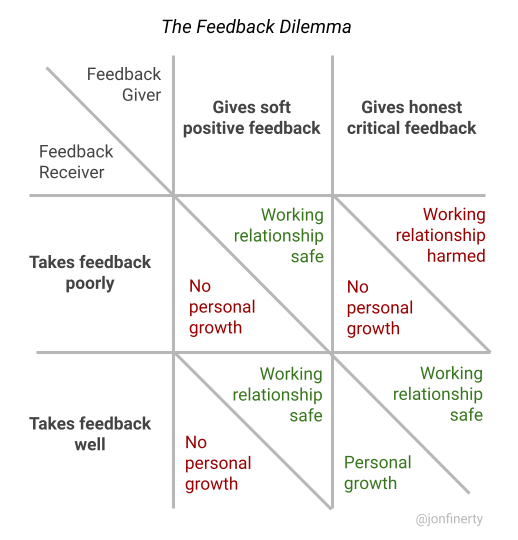Getting Feedback is a Skill
As an Engineering Manager I’ve seen many Engineers stuck in mid-career limbo. The key to avoiding getting stuck is feedback. People think they’re getting feedback, but often it’s not the feedback they need to hear. Why is this?
Giving feedback to a colleague is a corporate prisoner’s dilemma. The prisoner’s dilemma is a bit of game theory that models the fact that two people acting selfishly is sub-optimal, but there is risk in being the only one who tries to cooperate.
Two prisoners are being sentenced. If only one testifies and betrays the other (who is staying silent), then they go free and the silent partner gets three years in jail. If they both betray each other and act selfishly, they get two years each. Finally if they both trust each other enough stay silent and cooperate then they each only get a year a piece. Acting selfishly and betraying the other minimises your own risk of three years behind jail, but precludes you from the result with lowest total penalty: cooperation.
Critical feedback (the most valuable kind!) at work follows similar patterns, bet wrong and trust someone who takes it badly and bridges get burned and relationships damaged. No doubt you can think of many people you’ve worked with who you’d be worried to critique, but remember others might perceive you as someone they can’t trust will take feedback either.
This might not happen too often in reality. You might feel strongly that you take feedback well and have low ego. But in reality just the imagined fear of feedback being taken the wrong way has a strong chilling effect on the quantity and quality of feedback you’ll receive.

Above is a subconscious risk-adverse model of feedback. The feedback giver has the choice between giving soft, easy feedback or tough critical feedback. They are risking the working relationship based on this choice combined with the receiver’s unknown reaction.
The feedback receiver’s outcome of positive personal growth is based on whether or not they take feedback well and internalise it. There’s little-to-no growth to be had from soft feedback.
So the giver wants to know the receiver is going to cooperate so that they both land in the happy bottom-right square, where there is growth and a safe relationship. But how do you build that trust with your feedback-givers?
You need to let people know in advance that you receive feedback well. Here’s how:
-
Accept feedback gracefully. Don’t explain away or lessen feedback if you disagree. Even if others are at fault keep the topic on your actions and learning points. This feedback is being given to you, is for you and for your benefit. You risk scaring future feedback away if you shift the spotlight.
-
Trust is built from evidence. Consistently react positively and gratefully to small feedback. Other’s confidence will grow that you can take harder truths. Have a strong reaction in the moment? Come back later and acknowledge it, actively show the relationship hasn’t been harmed.
-
Ask for feedback regularly. Create opportunities for people to get comfortable giving you feedback, far more frequently than typical performance/peer review cycles.
-
Be specific. If you ask for feedback about a particular behaviour, piece work or interaction you’re more likely to get honest feedback. Specific requests help both parties compartmentalise the feedback without feeling like the whole concept of ‘you’ is being attacked.
-
Set an introspective tone. Ease people in by starting with being self-critical. Look at yourself from an angle of curiosity & reflection to encourage them to problem solve with feedback. Avoid being self-deprecating where they’ll feel pressured to defend you with platitudes.
-
Get feedback from people with less at risk. Coaches/mentors work well because the dynamic starts with feedback as an expectation. That relationship also carries less risk as you don’t work directly together. However they will never have as much context as your co-workers.
Finally I know it’s scary opening up for honest feedback. Remember any critical view shared already existed in their heads, regardless of whether or not you know about it. It’s better you’re in the loop. Get the feedback you need to hear and move past your mid-career limbo.